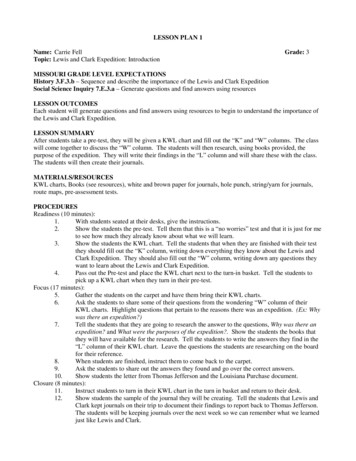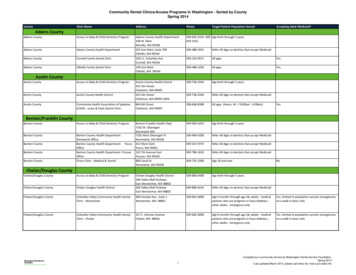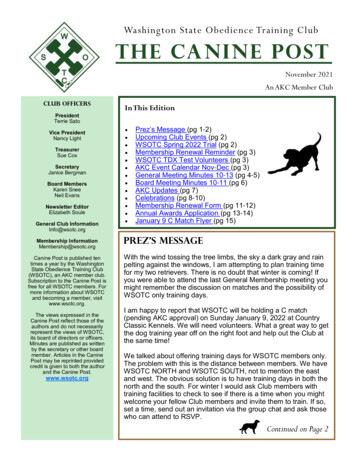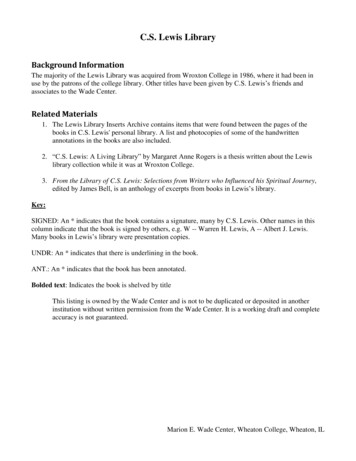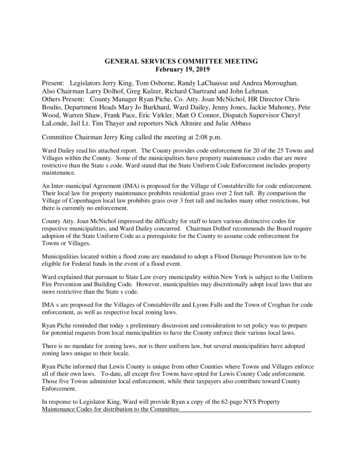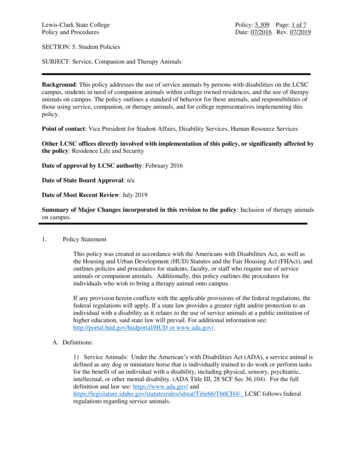
Transcription
Lewis-Clark State CollegePolicy and ProceduresPolicy: 5.309 Page: 1 of 7Date: 07/2016 Rev. 07/2019SECTION: 5. Student PoliciesSUBJECT: Service, Companion and Therapy AnimalsBackground: This policy addresses the use of service animals by persons with disabilities on the LCSCcampus, students in need of companion animals within college owned residences, and the use of therapyanimals on campus. The policy outlines a standard of behavior for these animals, and responsibilities ofthose using service, companion, or therapy animals, and for college representatives implementing thispolicy.Point of contact: Vice President for Student Affairs, Disability Services, Human Resource ServicesOther LCSC offices directly involved with implementation of this policy, or significantly affected bythe policy: Residence Life and SecurityDate of approval by LCSC authority: February 2016Date of State Board Approval: n/aDate of Most Recent Review: July 2019Summary of Major Changes incorporated in this revision to the policy: Inclusion of therapy animalson campus.1.Policy StatementThis policy was created in accordance with the Americans with Disabilities Act, as well asthe Housing and Urban Development (HUD) Statutes and the Fair Housing Act (FHAct), andoutlines policies and procedures for students, faculty, or staff who require use of serviceanimals or companion animals. Additionally, this policy outlines the procedures forindividuals who wish to bring a therapy animal onto campus.If any provision herein conflicts with the applicable provisions of the federal regulations, thefederal regulations will apply. If a state law provides a greater right and/or protection to anindividual with a disability as it relates to the use of service animals at a public institution ofhigher education, said state law will prevail. For additional information see:http://portal.hud.gov/hudportal/HUD or www.ada.gov/.A. Definitions:1) Service Animals: Under the American’s with Disabilities Act (ADA), a service animal isdefined as any dog or miniature horse that is individually trained to do work or perform tasksfor the benefit of an individual with a disability, including physical, sensory, psychiatric,intellectual, or other mental disability. (ADA Title III, 28 SCF Sec 36.104). For the fulldefinition and law see: https://www.ada.gov/ tat/Title66/T66CH4/. LCSC follows federalregulations regarding service animals.
Lewis-Clark State CollegePolicy and ProceduresPolicy: 5.309 Page: 2 of 7Date: 07/2016 Rev. 07/2019SECTION: 5. Student PoliciesSUBJECT: Service, Companion and Therapy Animals2)Service animals are not considered pets. Businesses and organizations that serve thepublic must allow individuals with disabilities to bring their service animals with themanywhere they would allow the individual to go without the animal – unless doing sowould pose a danger to health or safety or cause undue burden.3)In situations where it is not obvious that the dog or miniature horse is a service animal,the ADA allows only two specific questions may be asked:a.Is your service animal required because of a disability?b. What work or task has the service animal been trained to perform?4) It is not acceptable or respectful to require identification or certification or ask about thespecific type and nature of the individual's disability. You may not ask that the serviceanimal demonstrate training. The verbal statement of the individual should generally betaken as sufficient proof.5) If there is reason to question the legitimacy of a claim at Lewis-Clark State College, youshould inform Disability Services. Disability Services may be able to request additionalinformation to establish whether the dog or miniature horse is a service animal.2. Companion and Emotional Support Animals (ESA):A.Health care professionals have long recognized and documented the therapeutic effects ofanimal companionship and mental health. Sometimes, when an individual has a documenteddisability, a mental health care professional may recommend an “emotional support animal”or a “companion animal” as an essential part of treatment. For the purposes of this policy,these animals will be referred to as companion animals.B.It is important to note that companion animals are not “service animals” as defined by theADA. Companion animals are not trained to provide specific work or tasks directly linkedto an individual’s disability. At the college, a companion animal accommodation isrestricted to the housing in which the student resides (Fair Housing Act, FHA).C.Companion Animal Summary:1) A companion animal provides therapeutic benefit to someone with a verified mentalimpairment that substantially limits one or more major life activities.2) A companion animal is not a “service animal” trained to perform specific work or tasksdirectly linked to an individual’s disability, but rather provides prescriptive comfort to anindividual with a mental disability.
Lewis-Clark State CollegePolicy and ProceduresPolicy: 5.309 Page: 3 of 7Date: 07/2016 Rev. 07/2019SECTION: 5. Student PoliciesSUBJECT: Service, Companion and Therapy Animals3) A companion animal is considered a reasonable travel or housing accommodation (dog,cat, or other species), prescribed by the individual’s mental health professional (currentmedical documentation is required).4) Companion animals may not attend classes or campus activities with their handlers.5) The animal must be healthy, hygienic, and housebroken.6) The animal must be well behaved and under the handler’s control at all times.7) The animal and handler must not disrupt the normal flow of business.8) The handler is responsible for the animal’s health and well-being; as well as anynecessary cleanup and/or damage that their companion animal may cause.D.3.Requests to have a companion animal in LCSC housing are considered requests foraccommodation and will be reviewed on an individualized basis by Disability Services.Companion animals are not permitted to attend LCSC classes or activities.Procedure for Accommodations involving Companion AnimalsA.Provide the Disability Services office evidence of a documented disability, the need andjustification for a companion animal, and agree to the requirements outlined in theService/Companion Animal Agreement form. This must be updated annually.B.Residence Life requires dogs and cats approved as companion animals, wear currentvaccination and identification tags at all tml/Lewiston08.html.D.Specific rules and procedures for companion animals are presented to students afterDisability Services approves the request for a service animal.E. For a full definition and law see: http://portal.hud.gov/hudportal/HUD4.Therapy Animals:A.Therapy Animals under this policy refer to dogs and handlers that are trained or certified toprovide animal assisted interactions for educational and therapeutic purposes. Therapyanimals and handlers may be invited onto campus or utilized within specified educational ortherapeutic settings.B.Therapy Animal Summary:
Lewis-Clark State CollegePolicy and ProceduresPolicy: 5.309 Page: 4 of 7Date: 07/2016 Rev. 07/2019SECTION: 5. Student PoliciesSUBJECT: Service, Companion and Therapy Animals1) Registered therapy animal teams can provide affection, comfort, occupational therapy,education and entertainment to members of the public; typically in facility settings suchas hospitals, assisted living, and schools.2) Therapy animal teams have no special rights of access, except in facilities where they arewelcomed. For example, therapy animals may not enter businesses with “no pets”policies or accompany their handler in the cabin of an airplane regardless of their therapyanimal status.3) Therapy animal teams must be formally invited to visit LCSC or the handler must make aformal request to be a part of an official college sponsored program, educational activityor event.4) The animal must be housebroken.5) The animal must be well behaved and under the handler’s control at all times.6) The animal and handler must not disrupt the normal flow of business.7) The handler is responsible for the animal’s health and well-being; as well as anynecessary cleanup and/or damage that their therapy animal may cause.5. Pets:A.Per LCSC Policy 3.116, Animals are not allowed in any building owned or leased by LCSCunless required to assist an owner with a disability or for pre-approved educational orresearch purposes. Although interactions with animals are known to provide measurablebenefits to owners both with and without disabilities, general benefits do not qualify pets toaccompany their handler-owners on campus. In the State of Idaho, leaving a pet unattendedin a vehicle during prolonged inclement weather (hot or cold) is unlawful. All provisionsregarding animals on public property as outlined in Lewiston City Code, Art. I. Section 8-1through 8-20 and Art. II. Section 8-21 through 8-48 will apply.B. Request and Campus Notification Procedures1)Primary Contactsa. Students with service animals are not required to notify academic offices or officialsof the animal’s presence on campus. However, students residing in the ResidenceHalls must notify the Residence Hall office.b. Students requesting to have a companion or service animal in a college residence hall,must also complete and sign the Service/Companion Animal Agreement form. Formsare available on the Disability Services webpage at ons/
Lewis-Clark State CollegePolicy and ProceduresPolicy: 5.309 Page: 5 of 7Date: 07/2016 Rev. 07/2019SECTION: 5. Student PoliciesSUBJECT: Service, Companion and Therapy Animalsc. Students in need of a companion animal in the residence halls must contact theDisability Services office to determine their need, verify appropriate documentationand assist in communication with Residence Life office. Students requestingcompanion animals may contact:Disability ServicesLibrary 161208-792-2677d. Space in campus housing is appropriated on a first come, first served basis. Studentswho have been assigned a space in campus housing should begin making arrangementsto keep service or companion animals immediately. Students may not bring an animalinto their room until it has been approved by Disability Services and the student hasmet with Residence Life staff to review the rules for care and keeping of the animal.e. Employees with disabilities who use service animals, and supervisors or managers withquestions about service animals used by employees, may contact:Director, Human Resource ServicesAdministration Building, Room 102208-792-2269f.All students, faculty, staff and visitors or contractual service providers who require theuse of a service animal to participate in an event or activity on campus, or to performa required service should follow all guidelines outlined by the ADA Service Animalrequirements which can be found at: www.ada.gov/.g. Students, faculty, staff, or members of the public with questions or concerns involvingservice animals outside of regular work hours, contact:Campus SecurityMeriwether Lewis Hall, Room 110208-792-2226h. Therapy animal handlers must complete the Therapy Animal Agreement form locatedon the Human Resource Services website at http://www.lcsc.edu/hr/ . This form mustbe signed by the department head or supervisor and returned to the Human ResourceServices office at least one week prior to the animal’s arrival on campus. The TherapyAnimal Agreement form addresses the following items:i.The date(s), hour(s) and location(s) during which the therapy animal will be oncampus. (Note: This signage must be posted clearly in the building or general area atwhich the animal will be present at least one week prior to the animal’s arrival oncampus.)
Lewis-Clark State CollegePolicy and ProceduresPolicy: 5.309 Page: 6 of 7Date: 07/2016 Rev. 07/2019SECTION: 5. Student PoliciesSUBJECT: Service, Companion and Therapy Animalsi.The manner in which the animal will be supervised while on campusmust be described in detail. Unless the therapy animal is confined to acrate when not interacting with a student or employee, theemployee/handler must describe how the dog will be otherwisesupervised while on campus. The employee must describe how he or shewill accomplish assigned duties and responsibilities while supervisingthe animal. (When not in a crate, the therapy animal should be on a leashat all times.)ii.The therapy animal should be present in an area that is easy for thosewho do not wish to interact with the animal to avoid such contact. Thearea may be an outside or office area, but such an area should not beoffice space shared with others (such as a shared office or an officesuite). Therapy animals shall not be in food preparation or food serviceareas.C. Lewis-Clark State College - Service/Companion/Therapy Animal Responsibilities1) Upon learning a student has or is requesting a companion animal for on campus residencyand verification of the documentation for such an animal is in order, Disability Serviceswill provide a housing request verification that the student may present to housing.2) Physical Plant grounds crew will work with Residence Life to designate a reasonablelocation for the animal to toilet, and will keep the animal's toilet area free fromobstructions (snow, branches, etc.).3) Faculty and staff should contact LCSC Security if they have concerns regarding thebehavior of an animal in a particular classroom, course-related, or non-course-relatedsettings and locations.4) Disability Services will contact the identified alternate handler in the case of anemergency.5) Similar notifications and coordination will be conducted by Human Resource Servicesfor staff, contractors, and guests.D. Service and Companion Animal Handlers1) Handlers of service dogs are encouraged, but not required, to ensure the animal is wearingan identification tag (with handler contact name and phone number), and an identifyingcape, bandana, or harness at all times.2) The handler must be in control of the animal at all times.
Lewis-Clark State CollegePolicy and ProceduresPolicy: 5.309 Page: 7 of 7Date: 07/2016 Rev. 07/2019SECTION: 5. Student PoliciesSUBJECT: Service, Companion and Therapy Animals3) Handlers must ensure all animal needs are met and all public health and safety concernsare addressed properly.4) Handlers must maintain the health and hygiene of the animal and keep residence to agreedupon standards, as outlined by the Service/Companion Animal Agreement form.5) All animals must meet all the required state and municipal license requirements asoutlined here:Idaho Statutes: /Title25/T25CH35/Lewiston: iston08.html6) Handlers must assure their animal use designated areas on campus for outdoor toiletand/or exercise of the service or companion animal, and properly dispose of animal wasteimmediately, as outlined by the LCSC Service/Companion Animal Agreement form.7) Handlers must make prior arrangements for a person to take custody of the service orcompanion animal in the event of a handler emergency. The handler shall completecontact information for a backup handler on the Service/Companion Animal Agreementform.8) Handlers must have arrangements to house the animal off-campus if the handler intends tobe gone from the premises overnight or longer. Roommates are not expected to care forthe animal.9) Handlers shall be responsible for all liability and claims related to the service animal.E. Therapy Animals and Handlers Requirements1) The therapy animal must wear a harness, cape, identification tag or other gear that readilyidentifies its status at all times.2) The handler must be in full control of the therapy animal at all times. The care andsupervision of a therapy animal is solely the responsibility of its handler.3) The handler must assure the therapy animal is on a leash at all times, except when it iscrated. Exceptions will not be made.4) Handlers must assure their therapy animals meet local, county, and/or state license orpermit regulations. It is required that therapy animals have an owner identification tag.5) Handlers must comply with local, county, and/or state vaccination and healthrequirements, which may include distemper, Parvovirus, Parainfluenza, and Bordetella. Acopy of immunization records must be submitted with a proposal for the animal to be oncampus. Animals must have an annual clean bill of health from a licensed veterinarian,including current vaccinations and immunizations against diseases common to that type of
Lewis-Clark State CollegePolicy and ProceduresPolicy: 5.309 Page: 8 of 7Date: 07/2016 Rev. 07/2019SECTION: 5. Student PoliciesSUBJECT: Service, Companion and Therapy Animalsanimal. Therapy animals must be pest and parasite-free (i.e., not infested with fleas orticks).6) All handlers must carry equipment sufficient to clean up the animal’s feces, immediatelyremove the waste and be responsible for the proper disposal of the animal’s feces.Handlers are responsible for any damage caused by the waste or its removal. Crates andcages must be clean and odor-free.7) Handlers must assure that their animal is in control and remove the animal from collegefacilities if it becomes disruptive.8) Food and water areas must be kept clean, and food must be stored properly.F. Insurance RequirementsAny person who is approved to bring therapy animals onto campus property, whether on arecurring basis or on special occasions, must provide a commercial general liability certificateof insurance for the handler and therapy animal, with coverage of no less than 300,000 peroccurrence, and with the college named as an additional insured.G. Removal of a Service/Companion/Therapy Animal1.) LCSC may require a service, companion, or therapy animal to be removed from anyLCSC facility or location if one or more of the following occurs:a. The animal’s behavior is aggressive in nature.b. The handler is unable or unwilling to maintain proper control over the animal or ifthe other provisions outlined in this policy are unmetc. The animal’s presence creates a significant hazard to the academic or workplaceenvironment.d. The animal’s presence fundamentally alters or is disruptive to the workplace and/orlearning environment or educational program.e. The student consistently violates the terms set forth in the Service/CompanionAnimal Agreement form.f.Instances of conflicting disabilities (e.g. an extreme allergic reaction to animals) willbe reviewed by Disability Services or Human Resources, as appropriate, to considerthe needs of both persons, and to resolve the conflict as fairly and efficiently aspossible.
Lewis-Clark State CollegePolicy and ProceduresPolicy: 5.309 Page: 9 of 7Date: 07/2016 Rev. 07/2019SECTION: 5. Student PoliciesSUBJECT: Service, Companion and Therapy Animalsb)Companion animals are not to be left alone for more than four hours, depending onthe needs of the animal, in the resident’s room or apartment as specified and agreedto on the LCSC Service/Companion Animal Agreement form. In the event acompanion animal is left alone in a room or apartment for an unreasonable amount oftime, or is not being attended to as needed (food, time outside, allowed to create adisturbance, etc.), Residence Life will contact the resident or their emergency contactto remove the animal. If this is unsuccessful, LCSC may notify the City of LewistonAnimal Control Officer and have the animal removed from campus. Such action maybe taken by Residence Life without liability. Any cost of removing the animal shallbe the responsibility of the resident.H. Grievance and Complaint Procedure1) Any person dissatisfied with a decision concerning a service or companion animal shouldconsult the Disability Services Grievance Procedure Policy ce-procedure/.2) Any person who feels they have been discriminated against on the basis of their disabilityshould consult LCSC policy prohibiting Discrimination, Sexual Harassment, and SexualMisconduct at: ted.pdf.I.Non-compliance1. Violation of any portion of this policy may result in disciplinary action. Incidents will beevaluated on a case-by-case basis and may result in the following sanctions up to:a. Exclusion or expulsion in the case of students, orb. Exclusion up to and including dismissal from employment in the case of faculty and staff, orc. Exclusion from campus, in the case of the public2. If the handler feels they have been improperly excluded from campus, the handler may contactDisability Services or Human Resource Services as appropriate.
necessary cleanup and/or damage that their companion animal may cause. D. Requests to have a companion animal in LCSC housing are considered requests for accommodation and will be reviewed on an individualized basis by Disability Services. Companion animals are not permitted to attend LCSC classes or activities. 3.

